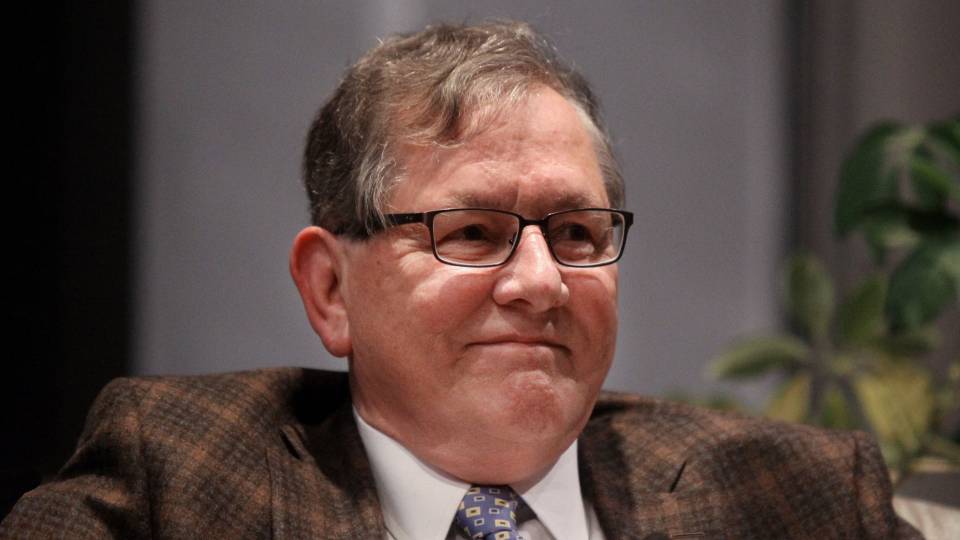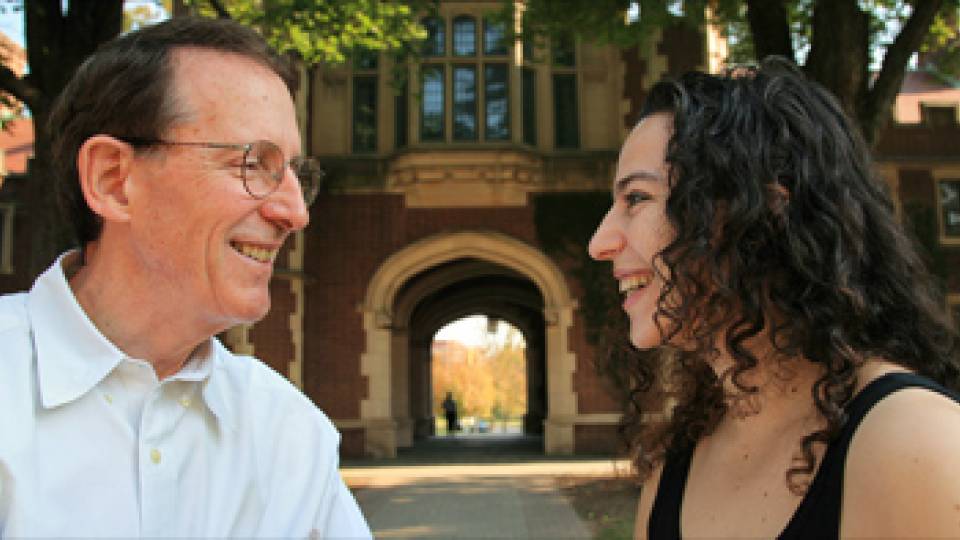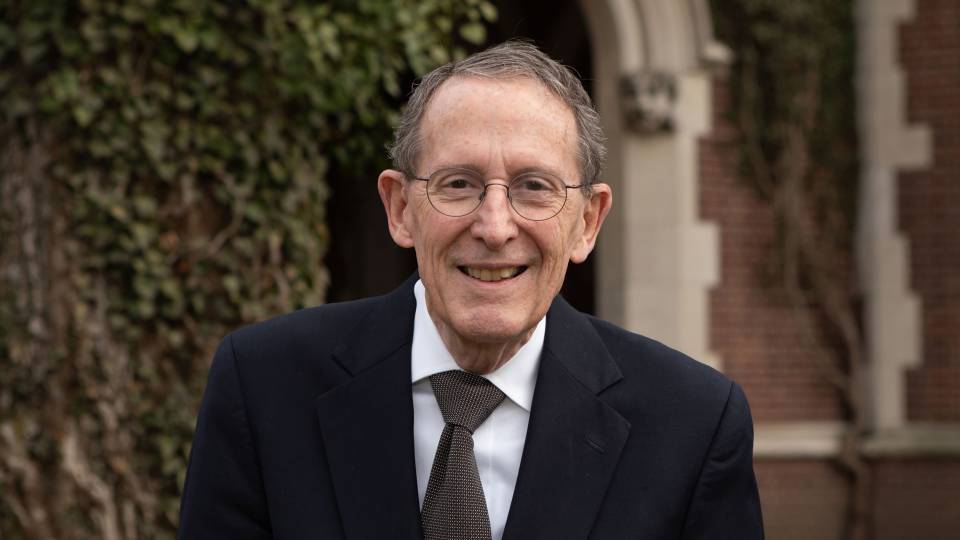Harry Frankfurt, professor of philosophy, emeritus, renowned for his scholarship on free will and moral responsibility, died from a number of causes, including congestive heart failure, at a care facility in Santa Monica, California, on July 16. He was 94.

Harry Frankfurt
Frankfurt joined Princeton’s faculty in 1990 and transferred to emeritus status in 2002. He made major contributions to the study of Descartes and Hume and specialized in foundational questions in metaphysics, epistemology, moral philosophy, philosophical anthropology, political philosophy and religion.
“Harry Frankfurt devoted himself to understanding humans: what we do, what we could have done, what we want to do, and even what we want to want to do,” said Benjamin Morison, professor of philosophy and department chair. “In philosophy, he will forever be associated with ‘Frankfurt cases,’ a special kind of counterexample in the philosophy of action.”
In an autobiographical essay published in 2011, Frankfurt described this counterexample, which refuted the long-held theory of moral constraint called the Principle of Alternative Possibilities: “I argued that what counts for moral responsibility is that the agent's act [was] an act that he really wanted to perform, and that it is not essential that the agent could have done something else instead.” Frankfurt’s 1969 seminal essay on this topic, "Freedom of the Will and the Concept of a Person,” generated ceaseless controversy.
“The debate continues to this day, more than 50 years after the initial paper,” said Daniel Garber, the A. Watson Armour, III, University Professor of Philosophy, who first met Frankfurt as a graduate student at Harvard University in the early 1970s, when Frankfurt was a visiting speaker. As a historian of philosophy, Garber calls Frankfurt’s “Demons, Dreamers and Madmen: The Defense of Reason in Descartes’ Meditations” (Princeton University Press, 1970) “one of the smartest and most original books published about Descartes.”
Frankfurt was also known for his work exploring issues central to the ordinary concerns of life, including two collections of essays “The Importance of What We Care About” and “Necessity, Volition and Love.” Garber said: “His reflections on freedom and morality over the years eventually led Harry to articulate a rich and original conception of our inner lives as human beings, competing levels of desire, and reflections on which desires we value and which we don’t, which ultimately shows the kind of people we are.”
Frankfurt also tackled unexpected territory. He once wrote an essay for a group of faculty who met monthly at Yale University (where he taught from 1976 to 1989) “treating the notion of bullshit with full analytic philosophy rigor,” Garber said. “No one was more surprised than Harry was when Princeton University Press proposed publishing it as a book.”
Titled “On Bullshit,” the slim volume — just 80 pages long — was published in 2005. Morison called it “a gem of a book neatly encapsulating just how far his understanding of humans stretched.” It hit No. 1 on The New York Times bestseller list; since 2005, it has sold more than 700,000 copies worldwide and has been published in translation in 31 foreign editions.
Debra Liese, curator of ideas and content partnerships at Princeton University Press, was the publicist for the book and accompanied Frankfurt — who was unexpectedly thrown into the public spotlight — from “The Daily Show with Jon Stewart” to the “Today” show to “60 Minutes.” “In spite of its amusing title, it was a quite serious essay deeply concerned with the nature of truth,” she said. “What I remember most about Harry is his gentle spirit, how deeply he cared about fundamental truths in the world around us and how we communicate with each other.”
Frankfurt continued to write about this topic with his book “On Truth” (Knopf, 2006). Later, he wrote “On Inequality” (2016) and “The Reasons of Love” (2019), a meditation on how and why we love, both published by Princeton University Press.
Michael Smith, the McCosh Professor of Philosophy, was among the faculty who had advocated for Frankfurt to come to Princeton. “I knew Harry's work on what it is to act of your own free will very well,” he said. “Indeed, that work had become and has remained a touchstone for much of my own. Since I already thought of him as a god, I couldn't believe it when he turned out to be so witty and self-deprecating.”
Frankfurt was also a longtime member of the executive committee of the University Center for Human Values (UCHV). “He was a key contributor in shaping multiple intellectual communities within the Center,” said Melissa Lane, the Class of 1943 Professor of Politics and director of UCHV. These included the undergraduate Human Values Forum, the Graduate Prize Fellowship and the seminar with faculty and visiting fellows.
“He was intellectually fierce, but always generous, an inspiring figure [who] embodied the UCHV mission in more ways than one can list,” said Pratap Bhanu Mehta, a 1994 graduate alumnus and a member of the inaugural UCHV Graduate Prize Fellows cohort who is now a Laurance S. Rockefeller Visiting Professor with UCHV.
Frankfurt was born on May 29, 1929, and raised in Brooklyn and Baltimore by his adoptive parents, Bertha and Nathan Frankfurt, a piano teacher and a bookkeeper. His interest in philosophy was sparked in high school when he came across a volume of Bertrand Russell’s essays. He earned his bachelor’s (1949) and Ph.D. (1954) from Johns Hopkins University. He served in the Army from 1954 to 1956 until taking his first academic appointment at Ohio State University. He also taught at the State University of New York-Binghamton, Rockefeller University and Yale (where he was chair of the philosophy department from 1978 to 1987).
At Princeton, Frankfurt taught undergraduate courses including “Philosophy and the Modern Mind,” “Normative Ethics” and a Freshman Seminar, “The Good Life.” His graduate seminars included “Moral Philosophy,” “Systematic Ethics” and “Philosophy of Mind: Freedom and Responsibility,” among others.
His former students remember him with a combination of affection and awe.
“He was a towering figure in my life,” said Jennifer Hawkins, an associate research professor in philosophy at Duke University who earned her Ph.D. in 2000. It was the conversations she had with him that had the most impact on her — conversations she couldn’t get enough of.
“I tend to think of Harry as the most delightful grump I have ever known,” she said of her dissertation adviser. “I say ‘grump’ because he was frequently negative, pointing out things that were not as good as they could or should be, noticing poor philosophical arguments or poor policies in the world. He saw, and drew other people’s attention to, bullshit everywhere — surely I can say that, given that it is the title of his most famous essay/book? And yet, he was utterly charming in the way that he did it, and his remarks were always deeply illuminating.”
“Over time I have written a lot on the subject of love, partly due to Harry's influence,” said Troy Jollimore, a professor of philosophy at California State University-Chico who earned his Ph.D. in 1999. “He helped me see that productive disagreement is the lifeblood of what we philosophers do.”
Pamela Hieronymi, a professor of philosophy at UCLA and a 1992 Princeton graduate, took Frankfurt’s courses on Aristotle and a senior seminar on freedom of the will and credits him with encouraging her to attend graduate school. Twenty years later, when he moved to her neighborhood in Santa Monica, she struggled with having to call him Harry instead of Professor Frankfurt.
“His work has been my ideal: short, accessible essays that illuminate familiar aspects of human experience in a way that leaves us wiser,” Hieronymi said, noting that the themes in Frankfurt’s essay “The Importance of What We Care About” “became the cornerstone of my own research.”
Frankfurt was president of the American Philosophical Association’s Eastern Division in 1991-92 and was a fellow of the American Academy of Arts and Sciences. In 1993, he was awarded a Guggenheim Fellowship, and received awards from the National Endowment for the Humanities and The Andrew W. Mellon Foundation, among others. He was named the Romanell-Phi Beta Kappa Professor in Philosophy in 1999-2000.
He is survived by his wife, Joan Gilbert; two daughters from his first marriage, Kate Frankfurt and Jennifer Frankfurt; and three grandchildren.
View or share comments on a blog intended to honor Frankfurt’s life and legacy.






